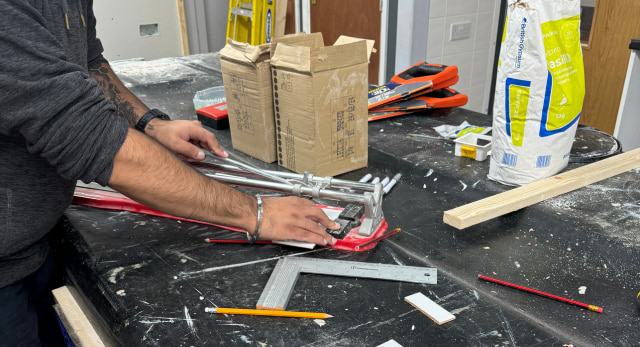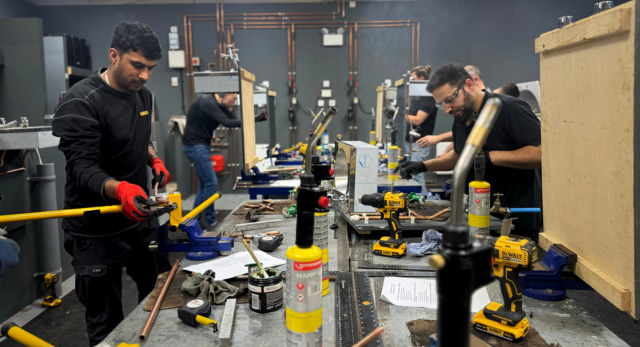Our recent survey of tradespeople across various sectors offers valuable insights into client expectations and service delivery. This article draws from these findings to help you enhance your customer service approach and build lasting relationships with clients.
How Tradespeople Communicate with Clients
Our survey revealed that email is the preferred communication method for nearly 38% of tradespeople, followed closely by phone calls at about 34%. In-person and text communication were each used by approximately 14% of respondents. When it comes to response times, the majority of tradespeople (55%) respond to client enquiries on the same day, while 28% respond within an hour, and 17% within 24 hours.
The main factors influencing response time include:
- Workload (cited by approximately 55% of respondents)
- Complexity of the enquiry (40%)
- Availability (31%)
- Only 3% of people said that emergencies or social activities were a factor that influenced response time the most.
In today’s fast-paced world, prompt communication is essential. Even if you can’t address an issue immediately, acknowledging receipt of a client’s enquiry can significantly enhance their experience.
What Clients Value Most
Our findings were clear. Quality of work remains the most valued aspect of service for clients, according to 79% of the tradespeople who were surveyed. Price was identified as the most important factor by about 14%, while communication was highlighted by approximately 7%.
This insight shows the importance of delivering exceptional service. While clients certainly care about cost and communication, they ultimately seek tradespeople who can deliver high-quality results. By focusing on excellence in your trade, you can build a reputation that attracts and retains clients.

Evolving Client Expectations
Interestingly, our survey showed mixed perspectives on whether client expectations have changed in recent years.
While about 41% of respondents indicated that expectations have remained stable, others noted specific changes:
- Increased price sensitivity and cost-cutting focus
- Demands for immediate service
- Greater awareness of products and pricing due to internet research
- Reduced patience and tolerance for delays
When asked about unrealistic client expectations, responses varied widely. Some common themes included expecting more work for less money, assuming tradespeople have staff on standby for immediate service, and hoping for discounts through various means.
To manage these expectations effectively, clear communication from the outset is essential. Being transparent about timelines, costs, and potential challenges can help set realistic expectations and avoid disappointment.
Common Challenges and How to Address Them
The survey identified several common challenges that tradespeople face with clients:
- Late payments – 41%
- Unrealistic expectations – 31%
- Lack of communication – 17%
The other 11% noted that there wasn’t a common challenge that they faced with their clients.
These challenges can be addressed through proactive measures:
- Late payments: Establish clear payment terms upfront, consider deposits for larger jobs, and implement a structured invoicing system.
- Unrealistic expectations: Set clear boundaries from the beginning, provide detailed quotes that outline what is and isn’t included, and communicate possible complications before they arise.
- Lack of communication: Establish regular check-ins throughout projects, provide updates on progress, and ensure clients have multiple ways to reach you.
Building Trust and Ensuring Satisfaction
Trust is the foundation of any successful client relationship. Our survey highlighted various approaches to building trust with new clients:
- Face-to-face contact
- Demonstrating expertise and knowledge
- Delivering on promises and exceeding expectations
- Transparent pricing and honest communication
Approximately 59% of respondents indicated that they set clear boundaries with clients regarding communication, timings, and project involvement. This proactive approach helps manage expectations and prevents misunderstandings.
Follow-up services also play a crucial role in client satisfaction, with about 79% of tradespeople offering such services after completing a job. However, only 31% consistently ask for client feedback, suggesting an opportunity for improvement in gathering insights for service enhancement.

Handling Client Complaints Effectively
When it comes to handling complaints, approximately 59% of surveyed tradespeople prefer informal discussions to resolve issues, while about 28% follow a formal process. Having a clear approach to managing difficult customers is essential for maintaining your professional reputation.
Consider these strategies for handling complaints:
- Practice active listening to fully understand the client’s concerns
- Remain calm and professional throughout the interaction
- Focus on solutions rather than assigning blame
- Follow up after resolution to ensure satisfaction
Best Practices for Exceptional Customer Service
Based on our survey findings and industry best practices, here are key strategies for delivering outstanding customer service:
- Be punctual and reliable: Arrive at the scheduled time or communicate delays promptly. Reliability builds trust and shows respect for your client’s time.
- Present a professional image: Dress appropriately, maintain clean vehicles and tools, and ensure all communication is professional. Companies like Snickers, DeWalt and Scruffs offer trade-specific clothing that helps you look the part.
- Set clear expectations: Be transparent about costs, timelines, and potential challenges from the outset. This approach aligns with the practices of companies renowned for excellent customer service.
- Go the extra mile: Small gestures like cleaning up thoroughly or completing minor additional tasks can leave a lasting positive impression and generate valuable referrals.
- Implement a field service customer experience system: Consider using job management software to streamline client communications and follow-ups.
Conclusion
Exceptional customer service is a powerful differentiator in the competitive trades industry. By understanding and meeting client expectations, you can build a strong reputation, earn repeat business, and generate valuable referrals.
Our survey findings highlight the importance of quality workmanship, prompt communication, transparent pricing, and professional conduct in delivering outstanding customer service. By implementing the strategies outlined in this guide, you can enhance your approach to client interactions and build lasting, profitable relationships.
At Logic4training, we’re committed to supporting tradespeople in all aspects of their professional development. For more information on our training courses and resources, visit our website or contact our team today.
FAQs
Why is customer service important for tradespeople?
Customer service is crucial for tradespeople as it helps build trust, secure repeat business, and generate referrals. Clients value clear communication, reliability, and high-quality work, which are all key aspects of excellent customer service.
What do clients value most when hiring a tradesperson?
Our survey found that nearly 80% of clients prioritise the quality of work above all else. Other factors like price and communication are important but secondary to delivering exceptional results.
How quickly should tradespeople respond to client enquiries?
Most tradespeople aim to respond within the same day, with about 28% responding within an hour. Prompt communication demonstrates professionalism and helps set a positive tone for the client relationship.
How can tradespeople manage unrealistic client expectations?
Unrealistic expectations can be addressed through clear communication from the outset. Provide detailed quotes, explain timelines and potential challenges, and set boundaries regarding project scope and involvement.
How should tradespeople handle complaints?
Complaints should be handled professionally and empathetically. Listen to the client’s concerns, investigate the issue, and offer a solution. Follow up after resolution to ensure satisfaction and maintain your reputation.









